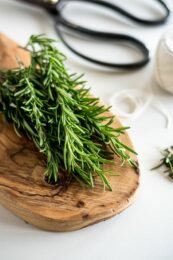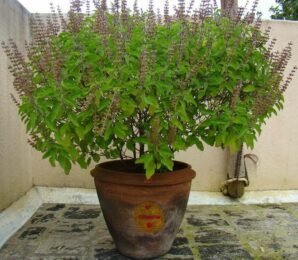Bringing the healing power of nature indoors can enhance your home’s decor, promoting both beauty and wellness. Medicinal plants and flowers provide a distinct combination of aesthetics and functionality, offering not only visual pleasure but also potential health benefits. In this article, we will look at the top ten medicinal plants and flowers that you should grow at home to improve your environment and promote a healthier lifestyle.
See also: 10 easy-to-grow indoor flowering plants to brighten your home
Mint (herb)
Mint is a versatile herb known for its refreshing aroma and various uses. It’s easy to grow, thriving in both indoor pots and outdoor gardens. To grow mint, plant seeds or seedlings in well-drained soil with partial sunlight. Keep the soil consistently moist and trim the plant regularly to encourage bushy growth. Mint spreads quickly, so consider planting it in a container to prevent it from taking over your garden.
Benefits
- Aids in digestion: Mint helps soothe the stomach and relieve indigestion or bloating.
- Freshens breath: Chewing on mint leaves or using mint-infused mouthwash can combat bad breath.
- Relieves headaches: The aroma of mint has a calming effect that may alleviate tension headaches.
- Reduces nausea: Mint’s cooling properties can ease feelings of nausea or motion sickness.
- Improves focus: Inhaling the scent of mint can promote alertness and enhance cognitive function.

Source: Pinterest
Aloe vera (Plant)
Aloe Vera is a resilient succulent plant celebrated for its healing properties, particularly for the skin. Growing Aloe Vera is relatively easy, requiring well-draining soil and bright, indirect sunlight. It’s essential not to overwater, as Aloe Vera prefers dry conditions and can rot if the soil is too moist. Simply cut a leaf from the plant, slice it open, and apply the gel directly to the affected area for relief.
Benefits
- Soothes sunburns: The cooling gel from Aloe Vera leaves can provide instant relief for sunburned skin, reducing redness and inflammation.
- Heals minor cuts: Aloe Vera gel possesses antibacterial properties that aid in the healing process of minor cuts and wounds, preventing infection.
- Alleviates irritations: Applying Aloe Vera gel can soothe various skin irritations, including itching, rashes, and insect bites, providing quick relief.
- Moisturises dry skin: Aloe Vera gel is hydrating and can help moisturise dry, flaky skin, leaving it feeling soft and supple.
- Promotes skin regeneration: Regular use of Aloe Vera gel can stimulate the production of collagen and elastin, promoting skin regeneration and reducing the appearance of scars.

Source: Pinterest
Lavender (Flower)
Lavender is a beautiful flowering plant known for its enchanting fragrance and therapeutic properties. Growing lavender is relatively simple; it requires well-drained soil, plenty of sunlight, and good air circulation. Cutting the plant on a regular basis will encourage new growth and vibrant blooms, and you can control its spread by planting it in pots or containers.
Benefits
- Stress relief: The soothing aroma of lavender can help reduce stress and anxiety levels, promoting relaxation and calmness.
- Sleep aid: One well-known use of lavender is to promote sleep. You can increase the length and quality of your sleep by placing dried lavender sachets or diffusing lavender essential oil next to your bed.
- Antiseptic properties: Because of its inherent antiseptic properties, lavender is a great natural remedy for small wounds, scrapes, and bug bites. To cleanse and soothe the skin, simply apply diluted lavender oil to the affected area.
- Headache relief: Inhaling the aroma of lavender essential oil or applying it to the temples can help alleviate headaches and migraines, providing relief from tension and discomfort.
- Mood enhancement: The pleasant scent of lavender can uplift your mood and promote a sense of well-being. Consider incorporating lavender essential oil into your daily routine for a mood-boosting effect.

Source: Pinterest
Echinacea (Flower)
Echinacea, also known as purple coneflower, is a vibrant flowering herb celebrated for its immune-boosting properties. Growing echinacea requires well-drained soil and full sunlight, making it an excellent addition to your garden or herb patch. Ensure proper watering, especially during hot and dry periods, to support healthy growth and blooming.
Benefits
- Immune support: Echinacea is renowned for its ability to strengthen the immune system, helping the body fight off infections and illnesses more effectively.
- Cold relief: Research suggests that echinacea may help reduce the severity and duration of cold symptoms when taken at the onset of illness. Consider brewing echinacea tea or taking echinacea supplements to alleviate cold symptoms.
- Anti-inflammatory properties: Echinacea possesses natural anti-inflammatory properties, making it beneficial for relieving pain and inflammation associated with conditions like arthritis and respiratory infections.
- Wound healing: Topical applications of echinacea extracts or ointments may aid in wound healing by promoting tissue repair and reducing the risk of infection.
- Antioxidant activity: Echinacea contains antioxidants that help neutralise harmful free radicals in the body, protecting cells from oxidative damage and supporting overall health and well-being.

Source: Pinterest
Basil (Herb)
Basil, a versatile herb commonly used in cooking, also offers numerous health benefits. Growing basil is relatively easy, requiring well-drained soil and plenty of sunlight, making it suitable for both outdoor gardens and indoor pots.
Benefits
- Anti-inflammatory properties: Basil contains essential oils with potent anti-inflammatory properties, which may help reduce inflammation and alleviate symptoms associated with conditions like arthritis and inflammatory bowel disease.
- Digestive aid: Consuming basil may support digestive health by promoting the secretion of digestive enzymes and easing symptoms of indigestion, bloating, and gas.
- Respiratory support: The aromatic compounds in basil, such as eugenol, have been found to have therapeutic effects on the respiratory system. Basil tea or steam inhalation with basil leaves may help relieve coughs, congestion, and asthma symptoms.
- Antimicrobial activity: Basil exhibits antimicrobial properties, making it effective against certain bacteria, viruses, and fungi. Including basil in your diet may help boost your immune system and protect against infections.
- Stress relief: Basil contains compounds that possess adaptogenic properties, helping the body adapt to stress and promote relaxation. Enjoying basil-infused beverages or incorporating basil into your meals may help reduce stress and promote overall well-being.

Source: Pinterest
Rosemary (Herb)
Rosemary, a fragrant herb commonly used in cooking, offers a range of health benefits beyond its culinary applications. Growing rosemary requires well-drained soil and plenty of sunlight, making it suitable for both outdoor gardens and indoor pots.
Benefits
- Memory enhancement: Rosemary contains compounds that may improve cognitive function and memory. Inhaling the aroma of rosemary essential oil or consuming rosemary-infused foods may help enhance mental clarity and focus.
- Circulation stimulation: The active compounds in rosemary, such as rosmarinic acid and caffeic acid, have vasodilatory effects, meaning they help widen blood vessels and improve blood circulation. Regular consumption of rosemary may support cardiovascular health and reduce the risk of heart disease.
- Insect repellent: The strong aroma of rosemary is effective in repelling insects like mosquitoes, flies, and ants. Placing rosemary plants near windows or outdoor seating areas can help deter pests naturally.
- Anti-inflammatory properties: Rosemary contains potent anti-inflammatory compounds that may help alleviate pain and inflammation associated with conditions like arthritis and muscle soreness. Applying rosemary essential oil topically or consuming rosemary tea may provide relief from discomfort.
- Antioxidant protection: Rosemary is rich in antioxidants, including carnosic acid and rosmarinic acid, which help neutralise free radicals and protect cells from oxidative damage. Including rosemary in your diet may help reduce the risk of chronic diseases and promote overall health.

Source: Pinterest
Dandelions (Flower)
Dandelions, commonly dismissed as weeds, offer numerous health benefits. Growing dandelions is simple, as they thrive in various conditions and require minimal care, making them a resilient addition to any garden.
Benefits
- Diuretic properties: Dandelion leaves act as a natural diuretic, promoting the production of urine and helping to flush out excess water and toxins from the body. Consuming dandelion leaf tea or adding fresh leaves to salads may support kidney health and alleviate bloating and water retention.
- Liver support: The root of the dandelion plant contains compounds known as sesquiterpene lactones, which have been shown to support liver function and promote detoxification. Drinking dandelion root tea or taking dandelion root supplements may help cleanse and rejuvenate the liver, aiding in the removal of harmful substances from the body.
- Nutritional powerhouse: Dandelion leaves are rich in vitamins and minerals, including vitamin A, vitamin C, vitamin K, calcium, iron, and potassium. Incorporating dandelion greens into your diet can provide essential nutrients and support overall health.
- Digestive aid: Dandelion root contains bitter compounds that stimulate digestion and promote the production of digestive juices. Consuming dandelion root tea before meals may help improve appetite, relieve constipation, and alleviate symptoms of indigestion.
- Anti-inflammatory properties: Dandelion contains flavonoids and polyphenols with anti-inflammatory effects, which may help reduce inflammation and alleviate symptoms of conditions like arthritis and gout. Including dandelion greens in your diet or applying dandelion salve topically may help reduce pain and swelling associated with inflammatory conditions.

Source: Pinterest
Yarrow (Flower)
Yarrow, a resilient wildflower, offers remarkable wound-healing properties and serves as a natural remedy for minor injuries. Cultivating yarrow is straightforward, as it thrives in various soil types and requires minimal maintenance, making it an excellent addition to any garden.
Benefits
- Wound healing: Yarrow contains compounds such as tannins and flavonoids, which possess astringent and anti-inflammatory properties. Applying yarrow poultices or tinctures to minor cuts, scrapes, or bruises can help stop bleeding, reduce inflammation, and promote faster wound healing.
- Skin soothing: The anti-inflammatory and antimicrobial properties of yarrow make it effective in soothing various skin irritations, including rashes, insect bites, and minor burns. Using yarrow-infused oils or creams topically can help calm itching, redness, and swelling, providing relief from discomfort.
- Fever reducer: Yarrow has been traditionally used as a febrifuge, or fever reducer, due to its ability to induce sweating and lower body temperature. Consuming yarrow tea made from dried flowers and leaves may help alleviate fever symptoms associated with colds, flu, or infections.
- Digestive aid: Yarrow contains bitter compounds that stimulate digestion and promote the production of digestive enzymes. Drinking yarrow tea before meals can help improve appetite, relieve indigestion, and alleviate symptoms of bloating and gas.
- Menstrual support: Yarrow is known for its ability to regulate menstrual flow and relieve menstrual cramps. Consuming yarrow tea or tincture during menstruation may help reduce excessive bleeding and ease discomfort associated with menstrual pain.

Source: Pinterest
Lemon Balm (Herb)
Lemon Balm, a close relative of mint, shares similar digestive benefits and possesses additional therapeutic properties. Growing lemon balm is relatively easy, as it thrives in various climates and soil conditions, making it a versatile herb for any garden.
Benefits
- Digestive aid: Like mint, lemon balm contains compounds that help soothe digestive discomfort, including bloating, gas, and indigestion. Consuming lemon balm tea or incorporating fresh leaves into meals can promote healthy digestion and alleviate gastrointestinal issues.
- Anxiety relief: Lemon balm is known for its calming effects on the nervous system, making it a valuable herb for managing anxiety and stress. Drinking lemon balm tea or using its essential oil in aromatherapy can help induce relaxation, reduce tension, and improve mood.
- Cold sore treatment: The antiviral properties of lemon balm make it effective in treating cold sores caused by the herpes simplex virus. Applying lemon balm ointment or cream topically to cold sores can help reduce inflammation, relieve pain, and speed up healing.
- Sleep aid: Lemon balm has mild sedative properties that can help promote relaxation and improve sleep quality. Drinking lemon balm tea before bedtime or using its essential oil in a diffuser can help calm the mind, alleviate insomnia, and facilitate restful sleep.
- Antioxidant support: Lemon balm contains antioxidants such as rosmarinic acid and flavonoids, which help protect cells from oxidative damage caused by free radicals. Regular consumption of lemon balm tea or supplements may help boost overall health and reduce the risk of chronic diseases associated with oxidative stress.

Source: Pinterest
Thyme (Herb)
Thyme, which has a distinct flavour and an aromatic scent, is useful for more than just cooking; it also has antibacterial qualities and other health advantages. Thyme is a great addition to any herb garden because it grows easily in well-drained soil and bright sunlight.
Benefits
- Antibacterial properties: Thyme is a powerful antibacterial agent because it contains compounds like thymol that have antimicrobial properties. Drinking thyme tea or applying oil infused with thyme can aid in the treatment of bacterial infections and enhance general well-being.
- Cough and sore throat relief: Thyme is often used as a natural remedy for respiratory issues, including coughs and sore throats. Drinking thyme tea or inhaling thyme steam can help soothe throat irritation, reduce coughing, and alleviate respiratory discomfort.
- Acne treatment: Thyme possesses antimicrobial properties that make it effective in treating acne and other skin conditions. Applying diluted thyme essential oil topically to affected areas can help reduce inflammation, prevent bacterial growth, and promote clearer skin.
- Digestive aid: Thyme aids digestion by stimulating the production of digestive enzymes and relieving gastrointestinal discomfort. Consuming thyme-infused dishes or herbal preparations may help alleviate bloating, gas, and indigestion.
- Antioxidant support: Thyme is rich in antioxidants such as flavonoids and phenolic compounds, which help protect cells from oxidative damage and reduce inflammation. Incorporating thyme into your diet may help support overall health and reduce the risk of chronic diseases associated with oxidative stress.

Source: Pinterest
Holy Basil or Tulsi (Herb)
Holy Basil, also known as Tulsi, holds a revered position in Ayurvedic medicine due to its remarkable immune-boosting properties and anti-inflammatory effects. Growing holy basil is relatively straightforward, as it thrives in warm, sunny conditions and well-drained soil, making it a valuable addition to any herb garden.
Benefits
- Immune-boosting properties: Holy basil is renowned for its ability to enhance the immune system and improve resilience against infections and illnesses. Consuming holy basil tea or incorporating fresh leaves into meals may help strengthen immunity and promote overall health.
- Anti-inflammatory effects: Holy basil contains compounds like eugenol and rosmarinic acid, which exhibit potent anti-inflammatory properties. Regular consumption of holy basil tea or extracts may help reduce inflammation throughout the body, alleviate symptoms of inflammatory conditions, and support joint health.
- Stress relief: Holy basil is considered an adaptogenic herb, meaning it helps the body adapt to stress and maintain balance. Drinking holy basil tea or taking supplements may help reduce stress levels, promote relaxation, and improve mental clarity and focus.
- Respiratory support: Holy basil is commonly used to relieve respiratory ailments such as coughs, colds, and asthma. Inhaling steam infused with holy basil leaves or consuming holy basil tea may help soothe respiratory inflammation, clear congestion, and promote easier breathing.
- Digestive aid: Holy basil aids digestion by stimulating the production of digestive enzymes and calming gastrointestinal inflammation. Drinking holy basil tea after meals or incorporating fresh leaves into culinary dishes may help alleviate digestive discomfort, reduce bloating, and enhance nutrient absorption.

Source: Pinterest
Feverfew (Flower)
Feverfew, a daisy-like flower, is believed to offer relief from migraine headaches by potentially reducing their frequency and severity. Cultivating feverfew is relatively straightforward, requiring well-drained soil and partial sunlight to thrive.
Benefits
- Migraine relief: Feverfew is primarily known for its potential to alleviate migraine symptoms. Consuming feverfew supplements or tea regularly may help reduce the frequency and intensity of migraine headaches, making it a valuable natural remedy for migraine sufferers.
- Anti-inflammatory properties: Feverfew contains compounds with anti-inflammatory properties, which may help reduce inflammation throughout the body. Incorporating feverfew into your diet or taking supplements may offer relief from various inflammatory conditions, such as arthritis and menstrual cramps.
- Digestive support: Some studies suggest that feverfew may aid digestion by promoting the production of digestive enzymes and reducing gastrointestinal inflammation. Consuming feverfew tea or extracts may help alleviate symptoms of indigestion, bloating, and stomach discomfort.
- Menstrual symptom relief: Feverfew is believed to have mild analgesic properties, which may help alleviate menstrual cramps and discomfort. Drinking feverfew tea during menstruation or taking feverfew supplements may help reduce menstrual pain and promote relaxation.
- Fever reduction: Traditionally, feverfew has been used to lower fever and alleviate flu-like symptoms. Consuming feverfew tea or extracts may help regulate body temperature and promote sweating, aiding in the body’s natural defence against infections and illnesses.

Source: Pinterest
FAQs
Chamomile, lavender, mint, and aloe vera - all grow with minimal care.
Chamomile, lavender, valerian root (consult a healthcare professional before use).
Yes, some of them are Sage, and calendula (for topical use).
Peppermint, ginger, and fennel (all have digestive benefits).
Chamomile, lemon balm, catnip (consult a healthcare professional before use).
Echinacea, holy basil (also known as Tulsi).
Calendula (for topical use), yarrow (for topical use).
Peppermint, feverfew (consult a healthcare professional before use).
Mint, peppermint and parsley are some great options.
Aloe vera (gel inside the leaves), calendula (for topical use). What are some easy-to-grow medicinal plants?
What can I grow for better sleep?
Are there plants to soothe a sore throat?
Can I grow anything to help with digestion?
What about natural remedies for anxiety?
Is there a plant that boosts the immune system?
Are there medicinal flowers for wound healing?
What plants can I use for headaches?
Can I grow anything to freshen my breath?
Is there a plant for skin irritations?
| Got any questions or point of view on our article? We would love to hear from you. Write to our Editor-in-Chief Jhumur Ghosh at [email protected] |

Sanskrati Gupta is an economics major currently pursuing her studies at Delhi University. She likes to explore world topics and share her thoughts and analysis through her writing.











